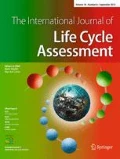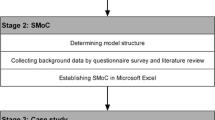Abstract
Purpose
Life cycle sustainability assessment (LCSA) is a method that combines three life cycle techniques, viz. environmental life cycle assessment (LCA), life cycle costing (LCC), and social life cycle assessment (S-LCA). This study is intended to develop a LCSA framework and a case study of LCSA for building construction projects.
Methods
A LCSA framework is proposed to combine the three life cycle techniques. In the modeling phases, three life cycle models are used in the LCSA framework, namely the environmental model of construction (EMoC), cost model of construction (CMoC), and social-impact model of construction (SMoC). A residential building project is applied to the proposed LCSA framework from “cradle to the end of construction” processes to unveil the limitations and future research needs of the LCSA framework.
Results and discussion
It is found that material extraction and manufacturing account for over 90 % to the environmental impacts while they contribute to 61 % to the construction cost. In terms of social impacts, on-site construction performs better than material extraction and manufacturing, and on-site construction has larger contributions to the positive social impacts. The model outcomes are validated through interviews with local experts in Hong Kong. The result indicates that the performance of the models is generally satisfactory.
Conclusions
The case study has confirmed that LCSA is feasible. Being one of the first applications of LCSA on building construction, this study fulfills the current research gap and paves the way for future development of LCSA.




Similar content being viewed by others
Abbreviations
- CMoC:
-
Cost model of construction
- EMoC:
-
Environment model of construction
- GFA:
-
Gross floor area
- HKHA:
-
Hong Kong Housing Authority
- LCA:
-
Environmental life cycle assessment
- LCC:
-
Life cycle costing
- LCI:
-
Life cycle inventory
- LCIA:
-
Life cycle impact assessment
- LCSA:
-
Life cycle sustainability assessment
- LCSD:
-
Life cycle sustainability dashboard
- LCST:
-
Life cycle sustainability triangle
- PRH:
-
Public rental housing
- sLCIA:
-
Social life cycle impact assessment
- S-LCA:
-
Social life cycle assessment
- SMoC:
-
Social-impact model of construction
References
Benoît C, Mazijn B (2009) Guidelines for social life cycle assessment of products. UNEP/SETAC Life Cycle Initiative, Sustainable Product and Consumption Branch, Paris
Bozhilova-Kisheva KP, Hu M, van Roekel E, Olsen SI (2012) An integrated life cycle inventory for demolition processes in the context of life cycle sustainability assessment. Paper presented at the International Symposium on Life Cycle Assessment and Construction—Civil Engineering and Buildings, Nantes
Dong YH, Ng ST (2014) Comparing the midpoint and endpoint approaches based on ReCiPe—a study of commercial buildings in Hong Kong. Int J Life Cycle Assess 19:1409–1423
Dong YH, Ng ST (2015a) A life cycle assessment model for evaluating the environmental impacts of building construction in Hong Kong. Build Environ 89:183–191
Dong YH, Ng ST (2015b) A social life cycle assessment model for building construction in Hong Kong. Int J Life Cycle Assess 20:1166–1180
Ekener-Petersen E, Finnveden G (2013) Potential hotspots identified by social LCA—part 1: a case study of a laptop computer. Int J Life Cycle Assess 18:127–143
Finkbeiner M, Schau EM, Lehmann A, Traverso M (2010) Towards life cycle sustainability assessment. Sustainability 2:3309–3322
Foolmaun RK, Ramjeawon T (2013) Life cycle sustainability assessments (LCSA) of four disposal scenarios for used polyethylene terephthalate (PET) bottles in Mauritius. Environ Dev Sustain 15:783–806
Foolmaun RK, Ramjeeawon T (2013) Comparative life cycle assessment and social life cycle assessment of used polyethylene terephthalate (PET) bottles in Mauritius. Int J Life Cycle Assess 18:155–171
Goedkoop M, Heijungs R, Huijbregts M, De Schryver A, Struijs J, van Zelm R (2009) ReCiPe 2008. Netherlands
Heijungs R, Huppes G, Guinée JB (2010) Life cycle assessment and sustainability analysis of products, materials and technologies. Toward a scientific framework for sustainability life cycle analysis. Polym Degrad Stab 95:422–428
HKGBC (2012) Building environmental assessment method BEAM plus new buildings version 1.2. Hong Kong Green Building Council, HKSAR
HKHA (2005) Life cycle assessment (LCA) and life cycle costing (LCC) study of building materials and components. Hong Kong Housing Authority, Hong Kong
Horvath A (2004) Construction materials and the environment. Annu Rev Environ Resour 29:181–204
Hu M, Kleijn R, Bozhilova-Kisheva KP, Di Maio F (2013) An approach to LCSA: the case of concrete recycling. Int J Life Cycle Assess 18:1793–1803
Huang T, Shi F, Tanikawa H, Fei J, Han J (2013) Materials demand and environmental impact of buildings construction and demolition in China based on dynamic material flow analysis. Resour Conserv Recy 72:91–101
ISO (2006a) ISO 14040: international standard. In: Environmental management—life cycle assessment—principles and framework. International Organisation for Standardization, Geneva
ISO (2006b) ISO 14044: international standard. In: Environmental management—life cycle assessment—requirements and guidelines. International Organization for Standardization, Geneva
Kloepffer W (2008) Life cycle sustainability assessment of products. Int J Life Cycle Assess 13:89–95
LD (2012) Report of the policy study on standard working hours. Hong Kong
Martínez-Blanco J, Lehmann A, Muñoz P, Antón A, Traverso M, Rieradevall J, Finkbeiner M (2014) Application challenges for the social life cycle assessment of fertilizers within life cycle sustainability assessment. J Clean Prod 69:34–48
Meyer C (2009) The greening of the concrete industry. Cem Concr Compos 31:601–605
Onat NC, Kucukvar M, Tatari O (2014) Integrating triple bottom line input–output analysis into life cycle sustainability assessment framework: the case for US buildings. Int J Life Cycle Assess 19:1488–1505
Schau EM, Traverso M, Finkbeiner M (2012) Life cycle approach to sustainability assessment: a case study of remanufactured alternators. J Reman 2:1–14
Swarr TE, Hunkeler D, WKlopffer W, Pesonen H, Ciroth A, Brent AC, Pagan R (2011) Environmental life cycle costing: a code of practice. SETAC, Pensacola
Traverso M, Asdrubali F, Francia A, Finkbeiner M (2012a) Towards life cycle sustainability assessment: an implementation to photovoltaic modules. Int J Life Cycle Assess 17:1068–1079
Traverso M, Finkbeiner M, Jørgensen A, Schneider L (2012b) Life cycle sustainability dashboard. J Ind Ecol 16:680–688
Udo de Haes HA (2008) The scientific basis for SLCA. Int J Life Cycle Assess 13:95
UNEP (2014) Why buildings. Sustainable buildings and climate change initiative, United Nations Environment Programme. http://www.unep.org/sbci/AboutSBCI/Background.asp. Accessed 7 Jan 2014
UNEP/SETAC (2012) Towards a life cycle sustainability assessment. Making informed choices on products. UNEP/SETAC, Paris
Valdivia S, Ugaya CM, Hildenbrand J, Traverso M, Mazijn B, Sonnemann G (2013) A UNEP/SETAC approach towards a life cycle sustainability assessment—our contribution to Rio + 20. Int J Life Cycle Assess 18:1673–1685
Vinyes E, Oliver-Solà J, Ugaya C, Rieradevall J, Gasol CM (2013) Application of LCSA to used cooking oil waste management. Int J Life Cycle Assess 18:445–455
WSA (2014) Steel’s contribution to a low carbon future—world steel position paper world steel association. Brussels, Belgium
Zamagni A (2012) Life cycle sustainability assessment. Int J Life Cycle Assess 17:373–376
Zamagni A, Pesonen H-L, Swarr T (2013) From LCA to life cycle sustainability assessment: concept, practice and future directions. Int J Life Cycle Assess 18:1637–1641
Acknowledgments
The authors would like to thank the Hong Kong Housing Authority for the support on this research. The work presented here was financially supported by Research Grants Council (RGC) under the General Research Fund (Grant No. 7160/11) and the HKU CRCG Seed Funding for Basic Research (Grant No. 201111159093).
Author information
Authors and Affiliations
Corresponding author
Ethics declarations
The authors declare that they have no conflict of interest. All procedures followed were in accordance with the ethical standards of the Human Research Ethics Committee for Non-clinical Faculties, The University of Hong Kong. Informed consent was obtained from all participants for being included in this study.
Additional information
Responsible editor: Matthias Finkbeiner
Rights and permissions
About this article
Cite this article
Dong, Y.H., Ng, S.T. A modeling framework to evaluate sustainability of building construction based on LCSA. Int J Life Cycle Assess 21, 555–568 (2016). https://doi.org/10.1007/s11367-016-1044-6
Received:
Accepted:
Published:
Issue Date:
DOI: https://doi.org/10.1007/s11367-016-1044-6




